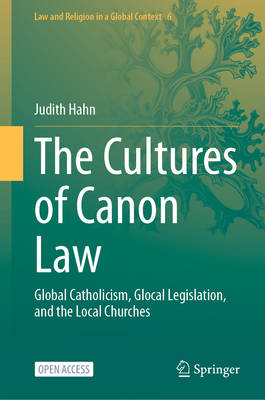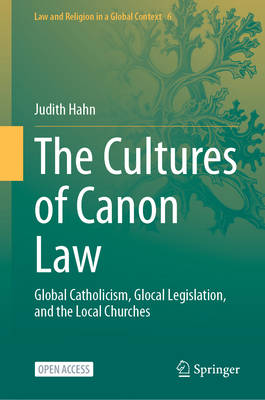
- Retrait en 2 heures
- Assortiment impressionnant
- Paiement sécurisé
- Toujours un magasin près de chez vous
- Retrait gratuit dans votre magasin Club
- 7.000.0000 titres dans notre catalogue
- Payer en toute sécurité
- Toujours un magasin près de chez vous
The Cultures of Canon Law
Global Catholicism, Glocal Legislation, and the Local Churches
Judith HahnDescription
This book is the first study to consider findings from sociology, legal anthropology, ethnology, legal pluralism, comparative law and theology in order to gain a better understanding of the diverse cultures of global Catholicism and the cross-cultural challenges arising from Roman Catholic canon law within the local churches. The author, renowned for her work at the intersection of socio-legal studies and canon law, examines the latter as a distinctive example of a European religious legal system that cuts across the myriad legal cultures of the local churches. In light of findings on legal transfer and legal colonialism, and by examining canon law within the emerging field of social and cultural studies approaches to law, her book sheds light on how canon law is imposed upon and received by the local churches around the world. It analyses the challenges and problems arising from the law s transcultural claims within these churches. Based on these observations, the study discusses the critical stance of canon law within contemporary Catholicism and the current debates on a synodal reform of the church and its law.
The book adopts different perspectives: As a sociological study, it describes the contemporary Eurocentrism of global canon law and the conflicts arising from it. As a theological study, it presents ecclesiological reasons for challenging the hegemony of global legislation. As a study of canon law, it suggests ways in which legislation could permit greater diversity while maintaining the unity of the universal church. By analysing canon law as a specific example of a religious legal order with cross-cultural ambitions and global claims, the book also contributes to the study of transnational law in general by illustrating the typical problems that accompany transnational legal regimes in both secular legal systems and religious groups.
This is an open access book.
Spécifications
Parties prenantes
- Auteur(s) :
- Editeur:
Contenu
- Nombre de pages :
- 253
- Langue:
- Anglais
- Collection :
- Tome:
- n° 6
Caractéristiques
- EAN:
- 9783032148117
- Date de parution :
- 18-02-26
- Format:
- Livre relié
- Format numérique:
- Genaaid
- Dimensions :
- 155 mm x 235 mm

Seulement chez Librairie Club
Les avis
Nous publions uniquement les avis qui respectent les conditions requises. Consultez nos conditions pour les avis.





